山西省怀仁县巨子学校高中部外研版高中英语必修五《Module 1 British and American English Grammar》课件(共46张PPT)
文档属性
| 名称 | 山西省怀仁县巨子学校高中部外研版高中英语必修五《Module 1 British and American English Grammar》课件(共46张PPT) |  | |
| 格式 | zip | ||
| 文件大小 | 5.9MB | ||
| 资源类型 | 教案 | ||
| 版本资源 | 外研版 | ||
| 科目 | 英语 | ||
| 更新时间 | 2015-10-11 18:06:48 | ||
图片预览

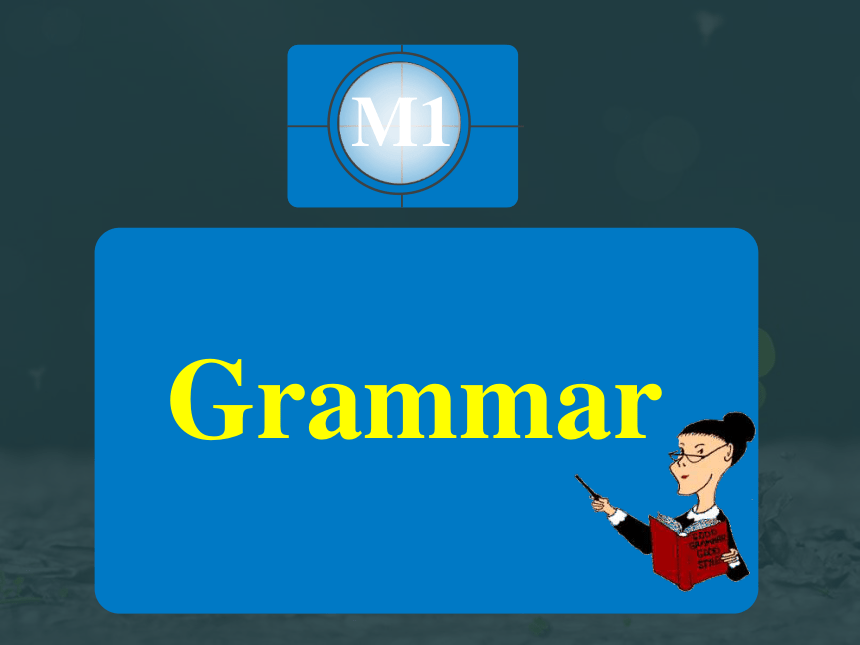
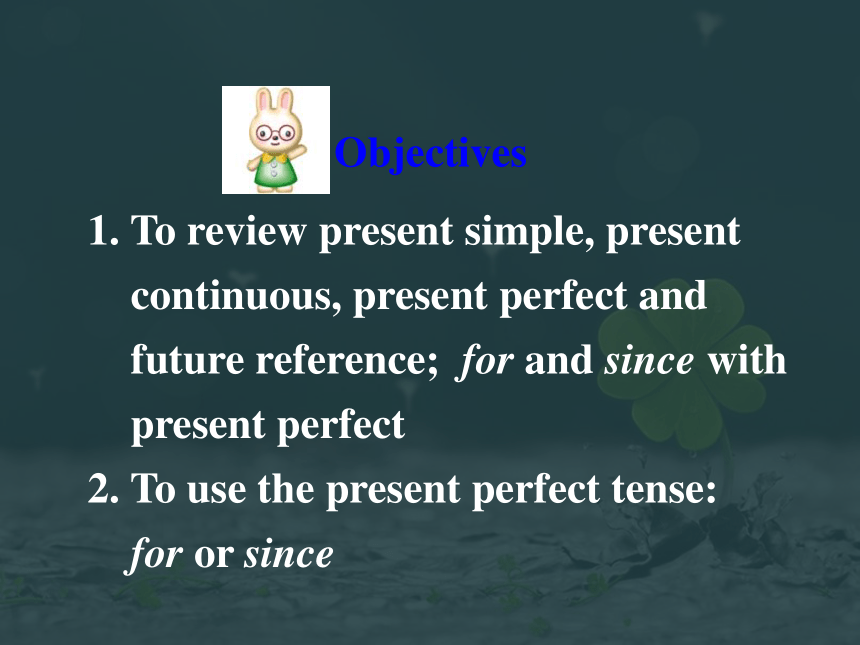

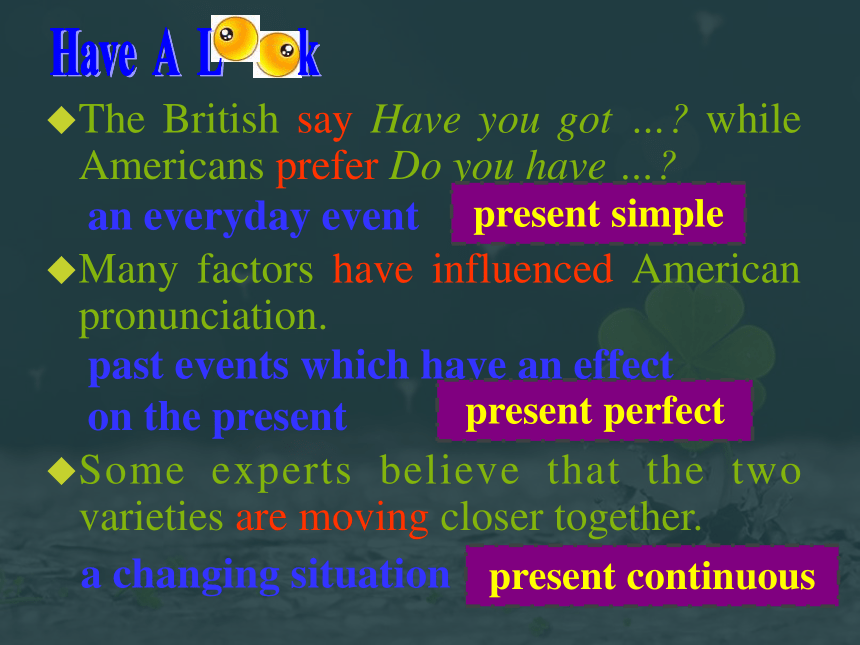
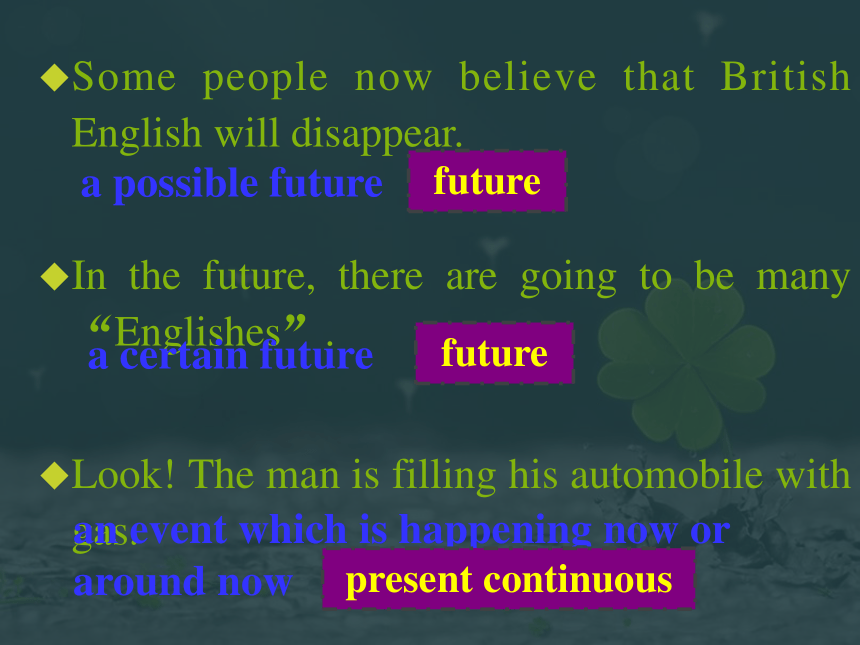

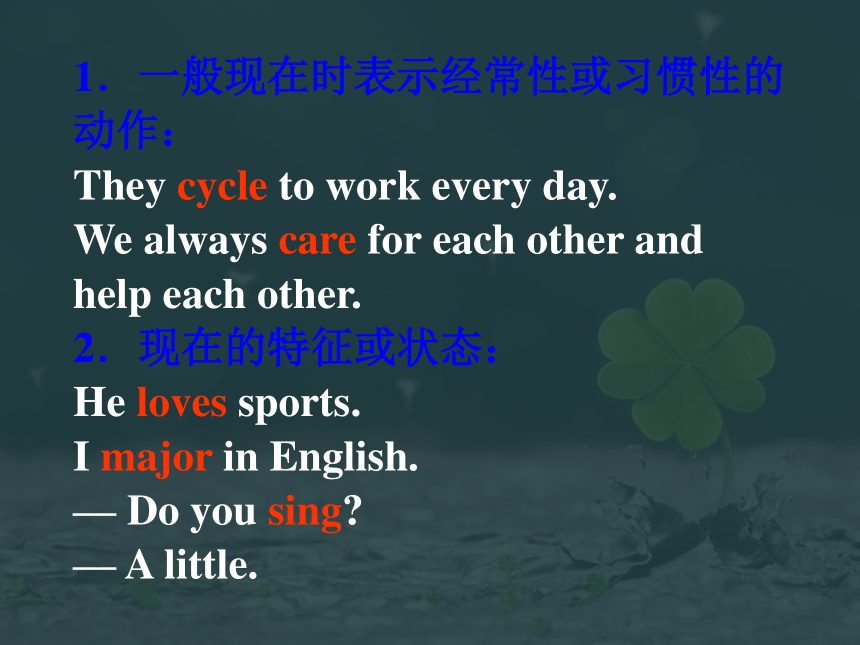
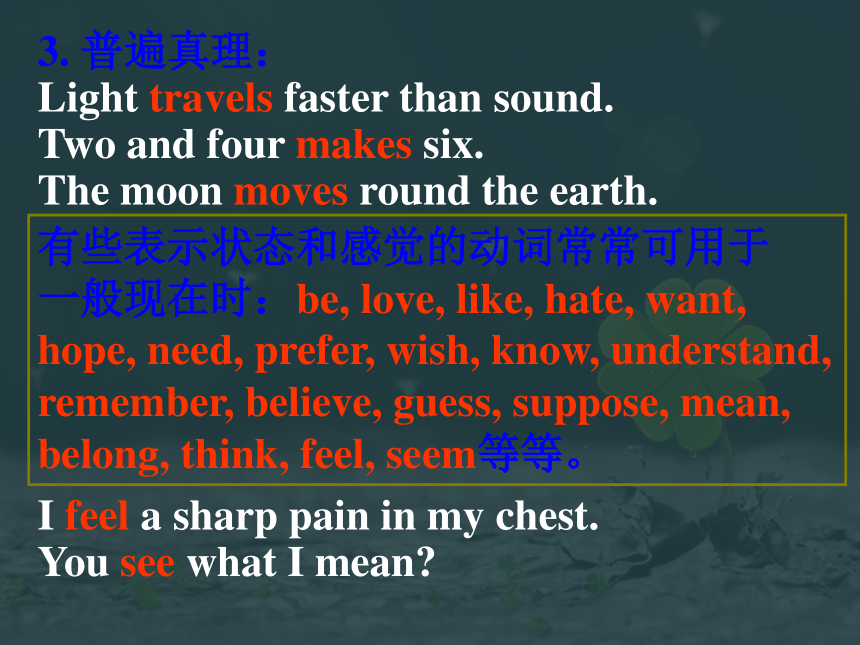
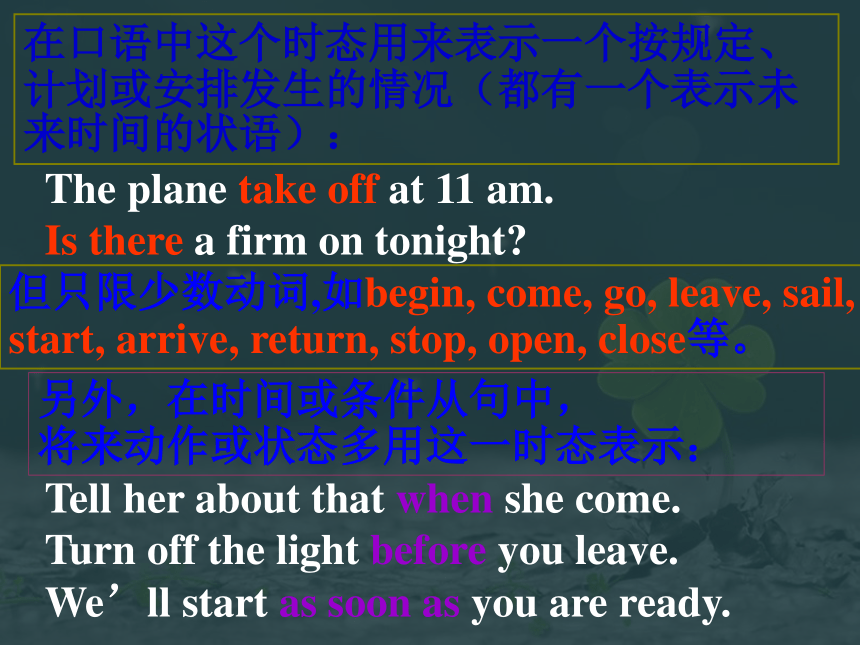
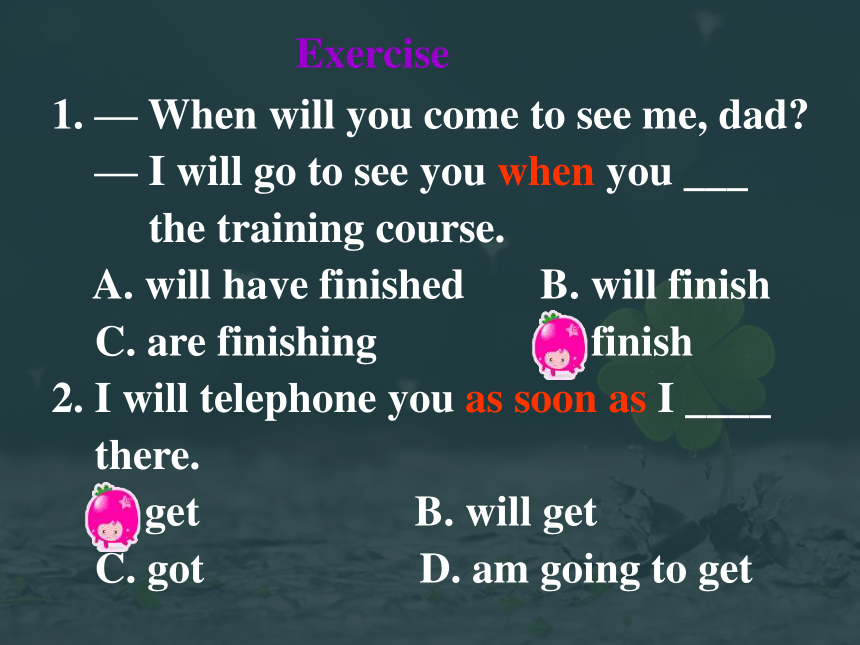
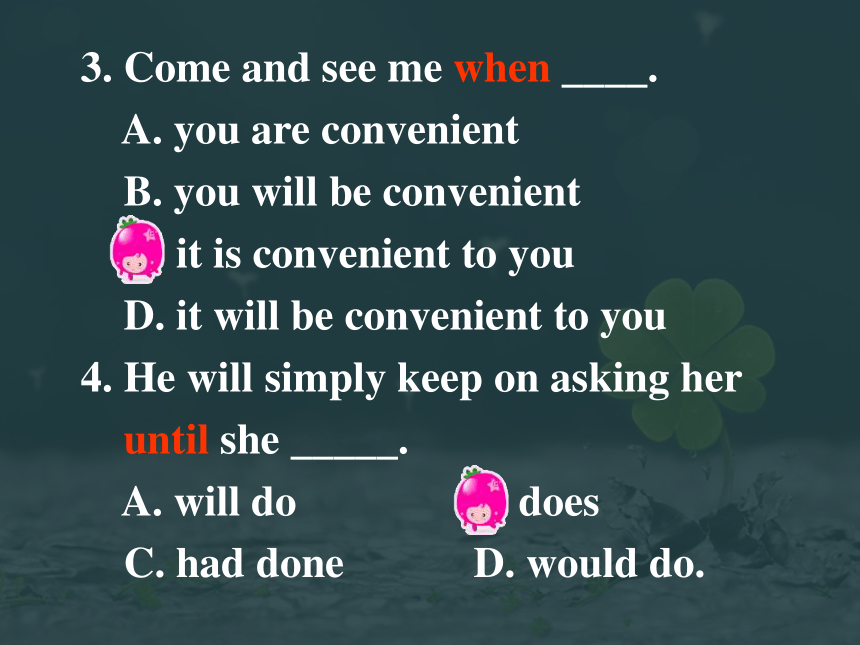
文档简介
课件46张PPT。外研新标准
第五册 必修5M1GrammarObjectives1. To review present simple, present
continuous, present perfect and
future reference; for and since with
present perfect
2. To use the present perfect tense:
for or since语法讲解建议采用归纳法,如尽可能多的呈现一些相关例句,或可让学生从已学课文中找相应例句,引导学生试着从所观察到的语言现象中总结出语言规则和语法规律。The British say Have you got …? while Americans prefer Do you have …?
Many factors have influenced American pronunciation.
Some experts believe that the two varieties are moving closer together.an everyday eventpast events which have an effect on the presenta changing situationpresent simplepresent perfectpresent continuousSome people now believe that British English will disappear.
In the future, there are going to be many “Englishes”.
Look! The man is filling his automobile with gas.a possible futurea certain futurean event which is happening now or around nowpresent continuousfuture future The Present Simple Tense
一般现在时 1.一般现在时表示经常性或习惯性的动作:
They?cycle?to?work?every?day.
We?always?care?for?each?other?and?
help?each?other.
2.现在的特征或状态:
He?loves?sports. I?major?in?English.
— Do?you?sing?
— A?little. 3. 普遍真理:
Light?travels?faster?than?sound. Two?and?four?makes?six. The?moon?moves?round?the?earth.
I?feel?a?sharp?pain?in?my?chest. You?see?what?I?mean? 有些表示状态和感觉的动词常常可用于
一般现在时:be, love, like, hate, want,
hope, need, prefer, wish, know, understand,
remember, believe, guess, suppose, mean,
belong, think, feel, seem等等。
The?plane?take?off?at?11?am. Is?there?a?firm?on?tonight?
Tell?her?about?that?when?she?come. Turn?off?the?light?before?you?leave. We’ll?start?as?soon?as?you?are?ready. 在口语中这个时态用来表示一个按规定、计划或安排发生的情况(都有一个表示未来时间的状语):另外,在时间或条件从句中,
将来动作或状态多用这一时态表示:但只限少数动词,如begin, come, go, leave, sail, start, arrive, return, stop, open, close等。1. — When will you come to see me, dad?
— I will go to see you when you ___
the training course.
A. will have finished B. will finish
C. are finishing D. finish
2. I will telephone you as soon as I ____
there.
A. get B. will get
C. got D. am going to getExercise3. Come and see me when ____.
A. you are convenient
B. you will be convenient
C. it is convenient to you
D. it will be convenient to you
4. He will simply keep on asking her
until she _____.
A. will do B. does
C. had done D. would do.The Present Continuous Tense
现在进行时 Jim is always coming late to class.
He’s always thinking of others.1)与always, all the time, constantly,
forever等连用,表示说话人责备,厌恶,
赞赏等感情,相当于“老是”。2)表示主语最近计划或按安排将要做的事,能这样使用的动词有go, come, leave,
arrive, stay, begin, see, meet, start等。He is meeting the manager tomorrow.a. He?is?always?thinking?of?his?work.
他总是想着他的工作。
He?is?constantly?leaving?his?thing?about.
她老是乱扔东西。
He?is?always?boasting.
他老爱说大话。(表赞许)(表不满)(表厌烦)现在进行时有时用来代替一般现在时,
表示一个经常性动作或状态,这是或是
为了表示一种感情(a)如赞叹、厌烦
等,或是为了强调情况的暂时性(b)。 b. He?is?sleeping?in?the?next?room?now.
他现在现在是在隔壁房间睡了。
(不再原来房间睡了)
The?professor?is?typing?his?own?letters?
while?his?secretary?is?ill. Where?is?he?working?
他现在在那里工作?
(可能刚换工作) 1. — So how long have you been here?
— Just a couple of days actually. I’m
on a big journey, you know. I _____
all the places of interest here.
A. am visiting B. visited
C. have visited D. will have visited
2. Because the shop ____, all the T-shirts
are sold at half prices.
A. has closed down B. closed down
C. is closing down D. had closed downExercise3. — I’m going to the States.
— How long ___ you___ in the States?
A. are; stayed B. are; staying
C. have; stayed D. did; stay
4. I’ve won a holiday for two weeks to
Florida. I ____ my mum.
A. am taking B. have taken
C. take D. will have taken 5. He ___ of how he can do more for the
people.
A. had always thought
B. is always thinking
C. has always been thought
D. thoughtThe Future Tense
将来时 I think everything will be OK.
我相信一切都会好的。
Jim is going to buy a new coat this winter.
Look at the dark clouds, it’s going to rain.1)will:表示说话时决定做的事;表示某种
预见;有一定的科学根据;用在“I think
/expect” 等后的从句中。2)be going to:有迹象表明要发生;事先
计划,考虑,安排要做的事。We’re to meet at 4:00 this afternoon.
The shop is to be opened in May.3)be about to do:表示即将发生的动作。
(一般不与时间状语连用,但可与when
从句连用) The meeting is about to begin.4)be to do:表示约定、计划、安排要做
的事。1. — Did you tell Julia about the result?
— Oh, no, I forgot. I ____ her now.
A. will be calling B. will call
C. call D. am to call
2. _____ you _____ free next Sunday?
A. Will; are B. Will; be
C. Do; be D. Are; beExercise3. He ____ very busy this week, he ___
free next week.
A. will be; is B. is; is
C. will be; will be D. is; will be
4. There _______ a dolphin show in the
zoo tomorrow evening.
A. was B. is going to have
C. will have D. is going to beThe Present Perfect Tense
现在完成时 现在完成时由have的人称形式加过去分词构成。现在完成时的肯定、否定及疑问形式如下:
I?have?read?it. I have?not?read?it. Have?you?read?it? I?have?seen?the?film?many?times. The?city?has?taken?on?a?new?look. 现在完成时表示现刻以前发生的动作或
情况,可以是:到现在为止的这一时期中发生的情况
(可能时多次动作的总和,也可表示状
态和习惯性动作):We?have?opened?up?50?mu?of?land?this?year. I?haven’t?seen?him?for?many?days. 2.?对现状有影响的某一已发生的动作:现在完成时可以用来表示发生在过去某
一时刻的, 持续到现在的动作 (用行为
动词表示) 或状态 (be动词表示) 常与
for (+时间段), since (+时间点或过去
时的句子) 连用。
1. for+时段 为……时间
2. since+过去一个时间点
(译为:自从……以来)
3. since+时段+ago
4. since+从句(过去时)
5. It is+时段+since+从句(过去时) Review复习下列时态:
1. 一般现在时
The Present Simple Tense
2. 现在进行时
The Present Continuous Tense
3. 将来时
The Future Tense
4. 现在完成时
The Present Perfect Tense1. — When did he go to America?
— Oh, he ____ there since half a year
ago.
A. went B. has been
C. has gone D. was
2. — How are you today?
— Oh, I ____ as ill as I do today for a
very long time.
A. didn’t feel B. wasn’t feeling
C. don’t feel D. haven’t feltExercise3. This is the first time that I ____ such a
mistake.
A. made B. make
C. have made D. had make
4. This was the first time that I ___ the
country.
A. has been in B. has gone to
C. had been to D. had gone to 5. Recently China ___ its first personal
robot.
A. had developed B. has developed
C. is developing D. developed
6. So far nothing ____ clear about the
meeting.
A. has done B. has been done
C. has made D. has been made1. English grammar has not changed much _____ the time of Shakespeare.
2. The American spelling system has existed ___ about 200 years.
3. I have been studying English _____ I was in primary school.
4. We have an American teacher. He has
been here ____ January.
5. CNN has been on the air ___ more
than twenty years.用since和for填空。sinceforsincesincefor汉译英1. 我有时步行去上班。
2. 从伦敦来的火车7:00到站。
3. 我一到那里就打电话给你。
4. 如果有需要,我帮你。
5. 现在正在下雨。
6. 会议在下午3:00开始。
7. 我去过巴黎两次。
8. 山姆先生已经搬到农村去住了。1. 我有时步行去上班。
2. 从伦敦来的火车7:00到站。
3. 我一到那里就打电话给你。
4. 如果有需要,我帮你。 Answers:I sometimes go to work on foot.The train from London arrives at 7:00.I’ll call you as soon as I get there.I’ll help you if you need.5. 现在正在下雨。
6. 会议在下午3:00开始。
7. 我去过巴黎两次。
8. 山姆先生已经搬到农村去住了。It is raining now.The meeting is beginning at three
this afternoon. I have been to Paris twice.Mr. Sam has gone to live in the
country. If their marketing plans succeed, they
____ their sales by 20 percent.
(2008 全国II)
A. will increase
B. have been increasing
C. have increased
D. would be increasing 实战高考2. — Do you think we should accept
that offer?
— Yes, we should, for we ___such
bad luck up till now, and time
_____ out. (2008 江西)
A. have had; is running
B. had; is running
C. have; has been run
D. have had; has been run 3. — Do you know if Terry will go
camping this weekend?
— Terry? Never! She ___ tents and
fresh air! (2008 上海)
A. has hated B. hated
C. will hate D. hates
4. — Have you got any job offers?
— No. I ______. (2008 辽宁)
A. waited B. had been waiting
C. have waited D. am waiting 5. According to the literary review,
Shakespeare _______ his characters
live through their language in his plays.
(2009 福建)
A. will make B. had made
C. was making D. makes
6. — What is the price of petrol these days?
— Oh, it ______ sharply since last month.
(2009 江西)
A. is raised B. has risen
C. has arisen D. is increased 7. My parents have promised to come to
see me before I _______ for Africa.
(2009 辽宁)
A. have left B. leave
C. left D. will leave
8. My parents _____ in Hong Kong. They
were born there and have never lived
anywhere else. (2009 天津)
A. live B. lived
C. were living D. will live 9. — I'm not finished with my dinner yet.
— But our friends ______ for us.
(2010 北京)
A. will wait B. wait
C. have waited D. are waiting
10. The palace caught fires three times in
the last century, and little of the original
building _______ now. (2010 重庆)
A. remains B. is remained
C. is remaining D. has been remained11. — I'm sorry, but I don't quite follow
you. Did you say you wanted to
return on September 20?
— Sorry, I _______ myself clear. We
want to return on October 20.
(2010 北京)
A. hadn't made B. wouldn't make
C. don't make D. haven't made 12. His first novel ______ good reviews
since it came out last month.
(2011 陕西)
A. receives B. is receiving
C. will receive D. has received
13. I’ll go to the library as soon as I finish
what I ______. (2011 辽宁)
A. was doing B. am doing
C. have done D. had been doing 14. It is the most instructive lecture that
I _______ since I carne to this school.
(2011 湖南)
A. attended B. had attended
C. am attending D. have attended
15. Look at the pride on Tom’s face. He
_______ to have been praised by the
manager just now. (2011 重庆)
A. seemed B. seems
C. had seemed D. is seemingThank you.
第五册 必修5M1GrammarObjectives1. To review present simple, present
continuous, present perfect and
future reference; for and since with
present perfect
2. To use the present perfect tense:
for or since语法讲解建议采用归纳法,如尽可能多的呈现一些相关例句,或可让学生从已学课文中找相应例句,引导学生试着从所观察到的语言现象中总结出语言规则和语法规律。The British say Have you got …? while Americans prefer Do you have …?
Many factors have influenced American pronunciation.
Some experts believe that the two varieties are moving closer together.an everyday eventpast events which have an effect on the presenta changing situationpresent simplepresent perfectpresent continuousSome people now believe that British English will disappear.
In the future, there are going to be many “Englishes”.
Look! The man is filling his automobile with gas.a possible futurea certain futurean event which is happening now or around nowpresent continuousfuture future The Present Simple Tense
一般现在时 1.一般现在时表示经常性或习惯性的动作:
They?cycle?to?work?every?day.
We?always?care?for?each?other?and?
help?each?other.
2.现在的特征或状态:
He?loves?sports. I?major?in?English.
— Do?you?sing?
— A?little. 3. 普遍真理:
Light?travels?faster?than?sound. Two?and?four?makes?six. The?moon?moves?round?the?earth.
I?feel?a?sharp?pain?in?my?chest. You?see?what?I?mean? 有些表示状态和感觉的动词常常可用于
一般现在时:be, love, like, hate, want,
hope, need, prefer, wish, know, understand,
remember, believe, guess, suppose, mean,
belong, think, feel, seem等等。
The?plane?take?off?at?11?am. Is?there?a?firm?on?tonight?
Tell?her?about?that?when?she?come. Turn?off?the?light?before?you?leave. We’ll?start?as?soon?as?you?are?ready. 在口语中这个时态用来表示一个按规定、计划或安排发生的情况(都有一个表示未来时间的状语):另外,在时间或条件从句中,
将来动作或状态多用这一时态表示:但只限少数动词,如begin, come, go, leave, sail, start, arrive, return, stop, open, close等。1. — When will you come to see me, dad?
— I will go to see you when you ___
the training course.
A. will have finished B. will finish
C. are finishing D. finish
2. I will telephone you as soon as I ____
there.
A. get B. will get
C. got D. am going to getExercise3. Come and see me when ____.
A. you are convenient
B. you will be convenient
C. it is convenient to you
D. it will be convenient to you
4. He will simply keep on asking her
until she _____.
A. will do B. does
C. had done D. would do.The Present Continuous Tense
现在进行时 Jim is always coming late to class.
He’s always thinking of others.1)与always, all the time, constantly,
forever等连用,表示说话人责备,厌恶,
赞赏等感情,相当于“老是”。2)表示主语最近计划或按安排将要做的事,能这样使用的动词有go, come, leave,
arrive, stay, begin, see, meet, start等。He is meeting the manager tomorrow.a. He?is?always?thinking?of?his?work.
他总是想着他的工作。
He?is?constantly?leaving?his?thing?about.
她老是乱扔东西。
He?is?always?boasting.
他老爱说大话。(表赞许)(表不满)(表厌烦)现在进行时有时用来代替一般现在时,
表示一个经常性动作或状态,这是或是
为了表示一种感情(a)如赞叹、厌烦
等,或是为了强调情况的暂时性(b)。 b. He?is?sleeping?in?the?next?room?now.
他现在现在是在隔壁房间睡了。
(不再原来房间睡了)
The?professor?is?typing?his?own?letters?
while?his?secretary?is?ill. Where?is?he?working?
他现在在那里工作?
(可能刚换工作) 1. — So how long have you been here?
— Just a couple of days actually. I’m
on a big journey, you know. I _____
all the places of interest here.
A. am visiting B. visited
C. have visited D. will have visited
2. Because the shop ____, all the T-shirts
are sold at half prices.
A. has closed down B. closed down
C. is closing down D. had closed downExercise3. — I’m going to the States.
— How long ___ you___ in the States?
A. are; stayed B. are; staying
C. have; stayed D. did; stay
4. I’ve won a holiday for two weeks to
Florida. I ____ my mum.
A. am taking B. have taken
C. take D. will have taken 5. He ___ of how he can do more for the
people.
A. had always thought
B. is always thinking
C. has always been thought
D. thoughtThe Future Tense
将来时 I think everything will be OK.
我相信一切都会好的。
Jim is going to buy a new coat this winter.
Look at the dark clouds, it’s going to rain.1)will:表示说话时决定做的事;表示某种
预见;有一定的科学根据;用在“I think
/expect” 等后的从句中。2)be going to:有迹象表明要发生;事先
计划,考虑,安排要做的事。We’re to meet at 4:00 this afternoon.
The shop is to be opened in May.3)be about to do:表示即将发生的动作。
(一般不与时间状语连用,但可与when
从句连用) The meeting is about to begin.4)be to do:表示约定、计划、安排要做
的事。1. — Did you tell Julia about the result?
— Oh, no, I forgot. I ____ her now.
A. will be calling B. will call
C. call D. am to call
2. _____ you _____ free next Sunday?
A. Will; are B. Will; be
C. Do; be D. Are; beExercise3. He ____ very busy this week, he ___
free next week.
A. will be; is B. is; is
C. will be; will be D. is; will be
4. There _______ a dolphin show in the
zoo tomorrow evening.
A. was B. is going to have
C. will have D. is going to beThe Present Perfect Tense
现在完成时 现在完成时由have的人称形式加过去分词构成。现在完成时的肯定、否定及疑问形式如下:
I?have?read?it. I have?not?read?it. Have?you?read?it? I?have?seen?the?film?many?times. The?city?has?taken?on?a?new?look. 现在完成时表示现刻以前发生的动作或
情况,可以是:到现在为止的这一时期中发生的情况
(可能时多次动作的总和,也可表示状
态和习惯性动作):We?have?opened?up?50?mu?of?land?this?year. I?haven’t?seen?him?for?many?days. 2.?对现状有影响的某一已发生的动作:现在完成时可以用来表示发生在过去某
一时刻的, 持续到现在的动作 (用行为
动词表示) 或状态 (be动词表示) 常与
for (+时间段), since (+时间点或过去
时的句子) 连用。
1. for+时段 为……时间
2. since+过去一个时间点
(译为:自从……以来)
3. since+时段+ago
4. since+从句(过去时)
5. It is+时段+since+从句(过去时) Review复习下列时态:
1. 一般现在时
The Present Simple Tense
2. 现在进行时
The Present Continuous Tense
3. 将来时
The Future Tense
4. 现在完成时
The Present Perfect Tense1. — When did he go to America?
— Oh, he ____ there since half a year
ago.
A. went B. has been
C. has gone D. was
2. — How are you today?
— Oh, I ____ as ill as I do today for a
very long time.
A. didn’t feel B. wasn’t feeling
C. don’t feel D. haven’t feltExercise3. This is the first time that I ____ such a
mistake.
A. made B. make
C. have made D. had make
4. This was the first time that I ___ the
country.
A. has been in B. has gone to
C. had been to D. had gone to 5. Recently China ___ its first personal
robot.
A. had developed B. has developed
C. is developing D. developed
6. So far nothing ____ clear about the
meeting.
A. has done B. has been done
C. has made D. has been made1. English grammar has not changed much _____ the time of Shakespeare.
2. The American spelling system has existed ___ about 200 years.
3. I have been studying English _____ I was in primary school.
4. We have an American teacher. He has
been here ____ January.
5. CNN has been on the air ___ more
than twenty years.用since和for填空。sinceforsincesincefor汉译英1. 我有时步行去上班。
2. 从伦敦来的火车7:00到站。
3. 我一到那里就打电话给你。
4. 如果有需要,我帮你。
5. 现在正在下雨。
6. 会议在下午3:00开始。
7. 我去过巴黎两次。
8. 山姆先生已经搬到农村去住了。1. 我有时步行去上班。
2. 从伦敦来的火车7:00到站。
3. 我一到那里就打电话给你。
4. 如果有需要,我帮你。 Answers:I sometimes go to work on foot.The train from London arrives at 7:00.I’ll call you as soon as I get there.I’ll help you if you need.5. 现在正在下雨。
6. 会议在下午3:00开始。
7. 我去过巴黎两次。
8. 山姆先生已经搬到农村去住了。It is raining now.The meeting is beginning at three
this afternoon. I have been to Paris twice.Mr. Sam has gone to live in the
country. If their marketing plans succeed, they
____ their sales by 20 percent.
(2008 全国II)
A. will increase
B. have been increasing
C. have increased
D. would be increasing 实战高考2. — Do you think we should accept
that offer?
— Yes, we should, for we ___such
bad luck up till now, and time
_____ out. (2008 江西)
A. have had; is running
B. had; is running
C. have; has been run
D. have had; has been run 3. — Do you know if Terry will go
camping this weekend?
— Terry? Never! She ___ tents and
fresh air! (2008 上海)
A. has hated B. hated
C. will hate D. hates
4. — Have you got any job offers?
— No. I ______. (2008 辽宁)
A. waited B. had been waiting
C. have waited D. am waiting 5. According to the literary review,
Shakespeare _______ his characters
live through their language in his plays.
(2009 福建)
A. will make B. had made
C. was making D. makes
6. — What is the price of petrol these days?
— Oh, it ______ sharply since last month.
(2009 江西)
A. is raised B. has risen
C. has arisen D. is increased 7. My parents have promised to come to
see me before I _______ for Africa.
(2009 辽宁)
A. have left B. leave
C. left D. will leave
8. My parents _____ in Hong Kong. They
were born there and have never lived
anywhere else. (2009 天津)
A. live B. lived
C. were living D. will live 9. — I'm not finished with my dinner yet.
— But our friends ______ for us.
(2010 北京)
A. will wait B. wait
C. have waited D. are waiting
10. The palace caught fires three times in
the last century, and little of the original
building _______ now. (2010 重庆)
A. remains B. is remained
C. is remaining D. has been remained11. — I'm sorry, but I don't quite follow
you. Did you say you wanted to
return on September 20?
— Sorry, I _______ myself clear. We
want to return on October 20.
(2010 北京)
A. hadn't made B. wouldn't make
C. don't make D. haven't made 12. His first novel ______ good reviews
since it came out last month.
(2011 陕西)
A. receives B. is receiving
C. will receive D. has received
13. I’ll go to the library as soon as I finish
what I ______. (2011 辽宁)
A. was doing B. am doing
C. have done D. had been doing 14. It is the most instructive lecture that
I _______ since I carne to this school.
(2011 湖南)
A. attended B. had attended
C. am attending D. have attended
15. Look at the pride on Tom’s face. He
_______ to have been praised by the
manager just now. (2011 重庆)
A. seemed B. seems
C. had seemed D. is seemingThank you.
